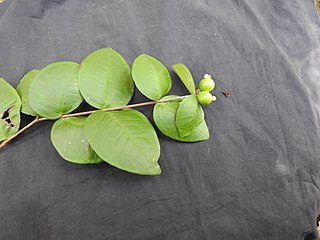
Carica is a genus of flowering plants in the family Caricaceae including C. papaya, the papaya, a widely cultivated fruit tree native to the American tropics.

Eugenia uniflora, the pitanga, Suriname cherry, Brazilian cherry, Cayenne cherry, cerisier carré, monkimonki kersie or ñangapirí, is a flowering plant in the family Myrtaceae, native to tropical South America’s east coast, ranging from Suriname, French Guiana to southern Brazil, as well as Uruguay and parts of Paraguay and Argentina. It is often used in gardens as a hedge or screen. The tree was introduced to Bermuda for ornamental purposes but is now out of control and listed as an invasive species. The tree has also been introduced to Florida.
Eugenia brevistyla is a species of plant in the family Myrtaceae. It is endemic to Brazil. Under its synonym Calycorectes australis, it was regarded as endangered, being threatened by habitat loss.
Eugenia discifera is a species of plant in the family Myrtaceae. It is endemic to India. It is threatened by habitat loss.

Eugenia floccosa is a species of plant in the family Myrtaceae. It is endemic to India. It is threatened by habitat loss.
Eugenia gilgii is a species of plant in the family Myrtaceae. It is found in Cameroon and Nigeria. Its natural habitat is subtropical or tropical dry forests. It is threatened by habitat loss.

Eugenia haematocarpa is a rare species of plant in the family Myrtaceae. It is endemic to Puerto Rico. It is classified as an endangered species by the U.S. Fish and Wildlife Service and there has been a plan for its recovery in place for some years. Its common names include uvillo and Luquillo Mountain stopper.
Eugenia hastilis is a species of plant in the family Myrtaceae. It is endemic to Mauritius. Its natural habitat is subtropical or tropical dry forests.
Eugenia hexovulata is a species of plant in the family Myrtaceae. It is endemic to Peru.
Eugenia indica is a species of plant in the family Myrtaceae. It is endemic to India.
Eugenia kameruniana is a species of plant in the family Myrtaceae. It is endemic to Cameroon. Its natural habitat is subtropical or tropical dry forests. It is threatened by habitat loss.

Eugenia koolauensis, commonly known as Koʻolau eugenia or nioi, is a species of flowering plant in the myrtle family, Myrtaceae. It is endemic to Hawaii, where it could previously be found on the islands of Molokaʻi and Oʻahu; today populations only exist on the latter. This is a federally listed endangered species of the United States.
Eugenia lamprophylla is a species of plant in the family Myrtaceae. It is endemic to Jamaica.
Eugenia prasina is a species of plant in the family Myrtaceae. It is endemic to Brazil.
Eugenia rottleriana is a species of plant in the family Myrtaceae. It is endemic to India.

Eugenia singampattiana is a critically endangered species of plant in the family Myrtaceae. It is endemic to the hills around Singampatti and Papanasam in the state of Tamil Nadu in India.
Eugenia vaughanii is a species of plant in the family Myrtaceae. It is endemic to Mauritius. Its natural habitat is subtropical or tropical dry forests.

Eugenia capensis, the dune myrtle, is a species of plant in the family Myrtaceae, which is native to East and southern Africa.
Psychotria crassipetala is a species of plant in the family Rubiaceae. This species was firstly described by E. Petit in 1964 and believed endemic to Kenya for a long time, but recently found also in Tanzania.
Eugenia excisa is a species of plant in the family Myrtaceae. It is endemic to eastern Cuba.







